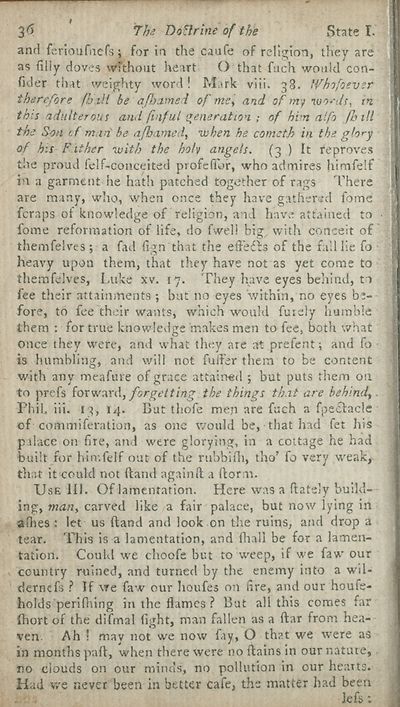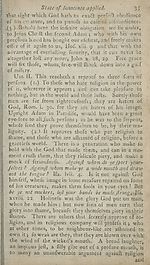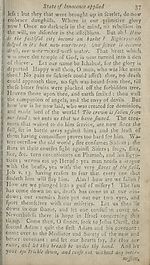Download files
Complete book:
Individual page:
Thumbnail gallery: Grid view | List view

3^> The Diftrine of the State I.
and ferioiifnefs; for in the caufe of religion, they are
as filly doves w’thout lieart O that fuch would con-
fider that weighty word! Mark viii. 38. tVhofoever
therefore fhi!t be a foamed of me ^ and of mj loo^du tn
this adulterous and finfut (feneration ; of him alfo fkill
the Son if m in be afhamed, when he cometb in the gh^y
of his Father with the boh angels. (3 ) It reproves j
the proud felf-conceited profefior, who admires himfelf 5
in a garment he hath patched together of rags There l
are many, who, when once they have gathered fome
fcraps of knowledge of religion, and have attained to ■ |
lome reformation of life, do fwel! big with conceit of
themfelves; a fad fign that the eifedbs of the fall lie fo
heavy upon them, that they have not as yet come to
themfelves, Luke xv. 17. They have eyes behind, tn
fee their attainments -, but no eyes within, no eyes be- |
fore, to fee their wants, which would fuiely humble
them : for true knowledge makes men to fee, both what
once they were, and what they ate at prefent; and fo
is humbling, and will not fuller them to be content |
with any meafure of grace attained ; but puts them oil
to prefs forward, forgetting the things that are behind,,
Phil, iii. 13, 14. But thofe men are fuch a fpe£lac!e
of commiferation, as one would be, that had fet his
palace on fire, and were glorying, in a cottage he had
built for hiiv.felf out of the rubbifii, tho’ fo very weak,
that it could not ftand again ft a ftorm.
Use 111. Of lamentation. Here was a ftately build¬
ing, man, carved like a fair palace, but now lying in
allies : let us (land and look on the ruins, and drop a
tear. This is a lamentation, and lhali be for a lamen¬
tation. Could we choofe but to weep, if we faw our
country ruined, and turned by the enemy into a wil-
derncfs ? If \re faw our lioufes on fire, and our houfe-
holds perifhing in the flames ? But all this comes far
Ihort of the difmal fight, man fallen as a ftar from hea¬
ven Ah ! may not we now fay, O that we were as
in months part, when there were no ftains in our nature,
no clouds on our minus, no pollution in our hearts.
Had vve never been in better cafe, the matter had been
and ferioiifnefs; for in the caufe of religion, they are
as filly doves w’thout lieart O that fuch would con-
fider that weighty word! Mark viii. 38. tVhofoever
therefore fhi!t be a foamed of me ^ and of mj loo^du tn
this adulterous and finfut (feneration ; of him alfo fkill
the Son if m in be afhamed, when he cometb in the gh^y
of his Father with the boh angels. (3 ) It reproves j
the proud felf-conceited profefior, who admires himfelf 5
in a garment he hath patched together of rags There l
are many, who, when once they have gathered fome
fcraps of knowledge of religion, and have attained to ■ |
lome reformation of life, do fwel! big with conceit of
themfelves; a fad fign that the eifedbs of the fall lie fo
heavy upon them, that they have not as yet come to
themfelves, Luke xv. 17. They have eyes behind, tn
fee their attainments -, but no eyes within, no eyes be- |
fore, to fee their wants, which would fuiely humble
them : for true knowledge makes men to fee, both what
once they were, and what they ate at prefent; and fo
is humbling, and will not fuller them to be content |
with any meafure of grace attained ; but puts them oil
to prefs forward, forgetting the things that are behind,,
Phil, iii. 13, 14. But thofe men are fuch a fpe£lac!e
of commiferation, as one would be, that had fet his
palace on fire, and were glorying, in a cottage he had
built for hiiv.felf out of the rubbifii, tho’ fo very weak,
that it could not ftand again ft a ftorm.
Use 111. Of lamentation. Here was a ftately build¬
ing, man, carved like a fair palace, but now lying in
allies : let us (land and look on the ruins, and drop a
tear. This is a lamentation, and lhali be for a lamen¬
tation. Could we choofe but to weep, if we faw our
country ruined, and turned by the enemy into a wil-
derncfs ? If \re faw our lioufes on fire, and our houfe-
holds perifhing in the flames ? But all this comes far
Ihort of the difmal fight, man fallen as a ftar from hea¬
ven Ah ! may not we now fay, O that we were as
in months part, when there were no ftains in our nature,
no clouds on our minus, no pollution in our hearts.
Had vve never been in better cafe, the matter had been
Set display mode to:
![]() Universal Viewer |
Universal Viewer | ![]() Mirador |
Large image | Transcription
Mirador |
Large image | Transcription
| Antiquarian books of Scotland > Religion & morality > Human nature in its fourfold state > (40) |
|---|
| Permanent URL | https://digital.nls.uk/107541626 |
|---|
| Description | Thousands of printed books from the Antiquarian Books of Scotland collection which dates from 1641 to the 1980s. The collection consists of 14,800 books which were published in Scotland or have a Scottish connection, e.g. through the author, printer or owner. Subjects covered include sport, education, diseases, adventure, occupations, Jacobites, politics and religion. Among the 29 languages represented are English, Gaelic, Italian, French, Russian and Swedish. |
|---|

